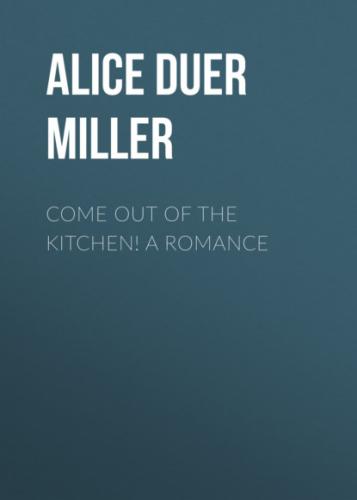"Crane is supposed to be engaged to the daughter," said the male voice.
"Well, I don't envy him his mother-in-law."
"What do you think of Crane?"
There was a pause. At first Tucker feared he might have missed the answer, but presently the question was repeated.
"I asked you what you thought of Crane."
"Oh, I've seen a good many young men of that type in my time," was the reply.
"How strange women are," remarked the ice-cream maker, who had now once again settled down to work. "I should have thought Crane just the man to attract women, well built, good-looking, a splendid horseman—"
"Would you say good-looking?" asked the cook. Tucker had been putting exactly the same question to himself.
But the speaker did not intend to answer it, he went on with his own train of thought: "And here you go into raptures over an old fellow, old enough to be your father—"
"Should you say I went into raptures?"
"You talk as if you were prepared to make an idol of the man."
A pleasant laugh greeted this statement. Tucker grew grave. He did not feel that he thoroughly understood the cause of that laugh, but he took refuge in that comfortable and all-embracing theory that women were fond, unaccountable creatures, particularly when deeply moved.
Another explanation was offered by the man below.
"I believe you are just trying to tease me, Jane-Ellen."
"Trying, Ranny?"
"You know very well you can always do whatever you like with me." The voice deepened with emotion.
"Oh, dear me, no, I can't."
"Why not?"
"I can't keep you turning steadily at that crank. Here, let me show you how it ought to be done."
Tucker knew that she had come out of the kitchen. By leaning over the railing he could see the kitchen door.
He leant over.
The space before the entrance was paved in large square flagstones; here an ice-cream freezer was standing, and over it bent a young man of a somewhat solid build, but with the unmistakable manner and bearing of a gentleman. He straightened himself as Jane-Ellen came out, and watched her closely as she grasped the handle of the freezer; but it seemed to the spectator above that he watched her with other emotions than the sincere wish to learn the correct manner of freezing.
Tucker looked straight down upon her, upon the part in her light brown hair, upon her round little arms, for her sleeves were rolled up above the elbow, as she said didactically:
"It ought to be a steady, even—"
But she got no further, for her pupil without a word, stooped forward and gathering her into his arms, kissed her.
IV
THERE was no doubt whatsoever in the mind of the spectator that this caress, provoked or unprovoked, was not agreeable to its recipient. The young man was large and heavy and she was minute and probably weak, but the violence of her recoil was sufficient to free her within a second.
"'Her strength,'" thought Tucker, "'was as the strength of ten,'" and he hoped it was for the reason alleged by the poet.
She stood an instant looking at her visitor, and then she said, in a tone that no well-trained dog would have attempted to disobey:
"Go away. Go home, and please don't ever come back."
Tucker was deeply moved. It is to be feared that he forgot Mrs. Falkener, forgot his plans for his friend's protection, forgot everything except that he had just heard himself described as a hero of romance by a girl of superlative charms; and that that girl had just been the object of the obviously unwelcome attentions of another. He recognized that the stern but sympathetic husband on the stage would instantly have come to the rescue of the weak young wife in any similar situation, and he determined on the instant to do so; but he found a slight difficulty in making up his mind as to the particular epigram with which he should enter. In fact, he could think of nothing except, "Ah, Jane-Ellen, is the ice-cream ready?" And that obviously wouldn't do.
While, however, he hesitated above, the dialogue below rushed on, unimpeded.
"The truth is," said the young man, with the violence of one who feels himself at least partially in the wrong, "the truth is you are a cold, cruel woman who thinks of nothing but her own amusement; you don't care anything about the sufferings of others, and in my opinion Lily is worth ten of you."
"Then why don't you go and kiss Lily?"
"Because Lily isn't that sort. She wouldn't stand it."
This reply not unnaturally angered the cook.
"And do you mean to say I stand it? I can't help it. I'm so horribly small, but if I could, I'd kill you, Randolph, and as it is, I hate you for doing it, hate you more than you have any idea."
"You know very well it's your own fault. You tempted me."
"How could I know about your silly lack of self-control?"
"You've always pretended to like me."
"Just what I did—pretended. But I'll never have to pretend again, thank heaven. I don't really like you and I never did—not since we were children."
"You'll be sorry for saying that, when you're calmer."
"I may be sorry for saying it, but I'll think it as long as I live."
"I pity the man who marries you, my girl. You've a bitter tongue."
"You'd marry me to-morrow, if you could."
"I would not."
"You would."
"Not if you were the last woman in the world."
Конец ознакомительного фрагмента.
Текст предоставлен ООО «ЛитРес».
Прочитайте эту книгу целиком, купив полную легальную версию на ЛитРес.
Безопасно оплатить книгу можно банковской картой Visa, MasterCard, Maestro, со счета мобильного телефона, с платежного терминала, в салоне МТС или Связной, через PayPal, WebMoney, Яндекс.Деньги, QIWI Кошелек, бонусными картами или другим удобным Вам способом.
